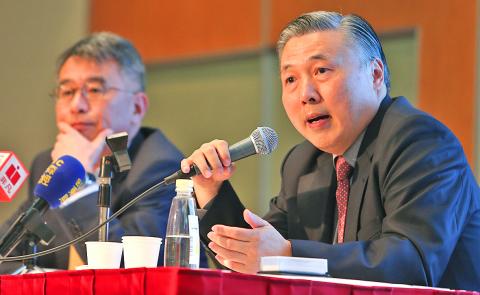Advanced Semiconductor Engineering (ASE, 日月光), the world’s largest chip packager and tester, yesterday said its revenue growth momentum would likely be restrained this quarter.
“At best, the situation in the first half can be described as an environment filled with mixed messages,” ASE chief operating officer Tien Wu (吳田玉) said, citing a downturn in the PC industry and tight inventory controls in the semiconductor supply chain.
The company’s third-quarter guidance foresees flat or limited growth of between 1 percent and 5 percent at its core integrated circuit assembly, test and material (IC ATM) business, but it expects gross margin to remain relatively unchanged from the first quarter.

Photo: CNA
This quarter, the company’s electronic manufacturing service (EMS) unit should see revenue grow by between 7 and 8 percent from the previous quarter to approach the levels seen in the fourth quarter last year, but the unit’s gross margin would likely decline slightly, the company told a press conference.
In the second half, ASE is expecting sequential revenue growth in both the IC ATM and EMS businesses, the company said.
It is also hoping to build momentum on its existing and upcoming new system-in-package (SiP) projects, such as 2.5D flip-chip IC solutions that promise 20 times the maximum input/output counts compared with the available alternatives.
ASE also said that it hopes to bolster its SiP paradigm and toolbox platforms to promote integration of heterogeneous components and functionalities in the most efficient form, as well as greater collaboration between global partners in the vertical supply chain.
“We are cautiously optimistic about sales prospects in the second half, despite low visibility,” Wu said.
Gross margin for the packaging business in the second quarter declined slightly to 22.7 percent from 23.7 percent, while the figure for its testing operations rose to 35.2 percent from 34.3 percent, materials operations declined from 17.1 percent to 16.2 percent and electronic manufacturing service declined from 8 percent to 6.4 percent.
“In the first half, we have seen more aggressive inventory adjustments by our clients, but such measures usually last no more than two quarters,” Wu said.
ASE reported second-quarter net income of NT$3.7 billion (US$117.1 million), or earnings per share of NT$0.48, down 18 percent quarter-on-quarter and 28.5 percent from the previous year.
Nevertheless, consolidated revenue in the first half rose 19.03 percent percent year-on-year to NT$134.9 billion to hit a new record high.
In particular, the sales contribution from the advanced SiP business tripled from the previous year, boosting its contribution to total revenue from 7 percent to 15 percent, the company said.

In Italy’s storied gold-making hubs, jewelers are reworking their designs to trim gold content as they race to blunt the effect of record prices and appeal to shoppers watching their budgets. Gold prices hit a record high on Thursday, surging near US$5,600 an ounce, more than double a year ago as geopolitical concerns and jitters over trade pushed investors toward the safe-haven asset. The rally is putting undue pressure on small artisans as they face mounting demands from customers, including international brands, to produce cheaper items, from signature pieces to wedding rings, according to interviews with four independent jewelers in Italy’s main

Japanese Prime Minister Sanae Takaichi has talked up the benefits of a weaker yen in a campaign speech, adopting a tone at odds with her finance ministry, which has refused to rule out any options to counter excessive foreign exchange volatility. Takaichi later softened her stance, saying she did not have a preference for the yen’s direction. “People say the weak yen is bad right now, but for export industries, it’s a major opportunity,” Takaichi said on Saturday at a rally for Liberal Democratic Party candidate Daishiro Yamagiwa in Kanagawa Prefecture ahead of a snap election on Sunday. “Whether it’s selling food or

CONCERNS: Tech companies investing in AI businesses that purchase their products have raised questions among investors that they are artificially propping up demand Nvidia Corp chief executive officer Jensen Huang (黃仁勳) on Saturday said that the company would be participating in OpenAI’s latest funding round, describing it as potentially “the largest investment we’ve ever made.” “We will invest a great deal of money,” Huang told reporters while visiting Taipei. “I believe in OpenAI. The work that they do is incredible. They’re one of the most consequential companies of our time.” Huang did not say exactly how much Nvidia might contribute, but described the investment as “huge.” “Let Sam announce how much he’s going to raise — it’s for him to decide,” Huang said, referring to OpenAI

The global server market is expected to grow 12.8 percent annually this year, with artificial intelligence (AI) servers projected to account for 16.5 percent, driven by continued investment in AI infrastructure by major cloud service providers (CSPs), market researcher TrendForce Corp (集邦科技) said yesterday. Global AI server shipments this year are expected to increase 28 percent year-on-year to more than 2.7 million units, driven by sustained demand from CSPs and government sovereign cloud projects, TrendForce analyst Frank Kung (龔明德) told the Taipei Times. Demand for GPU-based AI servers, including Nvidia Corp’s GB and Vera Rubin rack systems, is expected to remain high,